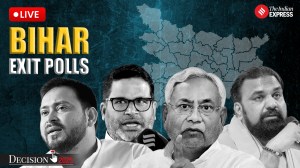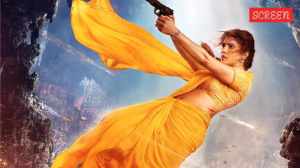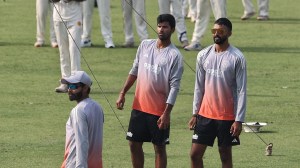COUPLE Diaries
Freshly-minted director Kiran Rao and hubby Aamir Khan (also producer and actor for Dhobi Ghat) on Mumbai city,their labour of love and more.
Freshly-minted director Kiran Rao and hubby Aamir Khan (also producer and actor for Dhobi Ghat) on Mumbai city,their labour of love and more.
Its on an unhurried Sunday that Screen is invited for an interview with debutant director Kiran Rao,whose film Dhobi Ghat has received rave reviews at international festivals and is up for release this week. Made on a budget of a little over five crore (approximately) the film,introduced as an arthouse movie,will see a fairly impressive presence with 400 prints within India and 180 prints overseas. The all Hindi and part Hindi-English versions will have a simultaneous release to make the movie more accessible to different audiences. But before that,Bollywoods It couple fields a few questions on Dhobi Ghat,the casting couch and a few painting sessions thrown in for good measure.
Kiran,Dhobi Ghat is your first film,a debut so to speak. Are you nervous?
Kiran: I am excited,anxious,nervous,everything at the same time. Right now I have the cant-wait-now-for-the-21st kind of feeling.
Aamir,surely you cant be nervous?
Aamir: I am even more nervous than her. More so because Dhobi Ghat is a very different and unusual film. In India,we dont make these kind of movies so I have no idea how people are going to react. Actually I never have an idea because each time my film is so different. I hope they will like it.
Do you think the glowing reviews in Huffington Post and other publications since the screening at Toronto International Film Festival,will help generate curiosity about the film?
Kiran: People do read those reviews but I dont know whether that would help but what will make a difference is if people like it. It is the kind of film that works with word-of-mouth kind of recommendations. And good reviews will help too.
How was it directing Aamir Khan?
Aamir: (laughs)
Kiran: It was wonderful. He is such a good,committed actor,talented of course,but a great team player. Very passionate,very involved. He was very happily living on the sets,which was not the easiest thing to do. So I thoroughly enjoyed working with him.
What are the pros and cons of directing the actor to whom you are married?
Kiran: Well,for one,I get to sleep with the leading actor (Chuckles)! The other pros are that I get a brilliant actor,which I would even if we were not married,but does not take away from the advantage. We are together so much of the time that I get to share a lot of thoughts in an intimate way.
The cons are that you tend to take a person for granted,though not as an actor. Actually that is the only con.
Aamir: I landed the role through the casting-couch! As for the downside,taking each other for granted is a minor thing because we all take people close to us for granted like our mother,sister,brother etc.
Does the proximity come in the way of objectivity?
Aamir: When you are emotionally involved with someone,you could like everything the person does. That could happen,but in my case,its unlikely because I am very protective of myself and what I get attached to as a creative person. If I didnt like the script I would not do it. I would have been supportive of her from outside as a husband,taken her out for dinner after work but not involved myself professionally. I cant cheat myself or my audience.
Kiran: At the end of the day,I work in the best interest of the film.
Did casting fresh faces become easy as you already had a bankable star in Aamir?
Kiran: I cast all of them before I cast Aamir.
Aamir: As a producer,I dont have qualms about casting someone who is not a star. We did that in Jaane Tu.. and Peepli Live. In fact,in this case,I was not cast because I was a star. My star status was going against me and I had to make sure I didnt allow my stardom to disturb the film,so I had to throw my stardom out of the window while shooting or promoting it. Even in promotions,I am not promoting it like an Aamir Khan film so that it gets a big opening and we can go laughing to the bank. I have a relationship with the audience that has spanned over 20 years and I cant mislead them. So when I am marketing my film,I want to be totally honest about the kind of film we have made and then let the audience decide whether they want to watch it or not.
Most people would not have called their film an arthouse film,but we have as thats the truth. From a marketing point of view,for me to say that Peepli .. was a social and political satire was hara-kiri because people feel hamari class le rahe hain etc, but that was the truth. I feel we should trust our poduct and the audience.
Kiran: A huge opening was not the consideration at all,and he came in later.
Considering this is your ode to the city,how long have you been in Mumbai?
Kiran: I did my college here for three years and then 12 years,so 15,but I know the city much better than him.
Aamir: Just because I have not visited three places does not mean that you know the city better! Maybe you know the city better in just the geographical sense.
Kiran: How else does one explore a city then?
Aamir: Emotionally? Psychologically,historically. See I have not been to Chowpatty in the 45 years that I have lived in the city because I am a Bandra boy,I dont need to go there. I have been to Juhu beach. I have been to the beach on Carter Road,have you been there?
Have you been to Dhobi Ghat?
Aamir: I have not been to Dhobi Ghat because I dont go to town. Bandra people dont go to town and thats a unique thing about Mumbai.
Kiran: Thats true,actually. What I am trying to say is that by virtue of coming into a city you tend to go out and try to find your feet in the city. You want to explore and locate yourself in a city as big as Mumbai, as opposed to when you have grown up and lived in a city. Which is why I feel that my perspective of the city is slightly different. It is that of someone who had to find her way as opposed to someone who was born here and therefore never needed to do that.
Why the myriad professions for the characters
Kiran: The film is about different cities within the city. There are so many layers to the city; lives of different classes intersect when we pass everyday on the train or in the street and thats what makes the city very exciting. It is very hard to put up the windows and not see anyone other than your own type of person. I wanted to show these different kinds of Mumbai and the four characters from very different worlds come together to make a collage that gives you a fuller picture of the city.
Whats been a unique Mumbai experience for you?
Kiran: My unique Mumbai experience is experiencing the city by night because I really think the city comes alive then. That was one of the things I wanted to capture in this film. Initially the photographer Shai was going to do photographs of people who have jobs at night. There are a whole lot of people whose day starts in the evening and ends in the morning and that was Shais original sabbatical in my first draft,or it was in my story draft. So thats something I love about Mumbai.
Aamir: I think we should go back to it. Lets reshoot the film (Chuckles). But seriously,I have to say the warmth of Mumbai is what I love. It is a very warm city emotionally. People are very relaxed and helpful.
Kiran: A lot of people from outside the city would disagree because they feel people have no time to even stop and give directions.
Aamir: No,thats not true at all. People may be in a hurry but they are very chilled-out. They are not concerned about what you are doing– they are not judgmental at all. Its also a very open and welcoming city and thats something I dont see often in other places in the world. Thats one quality which is unique. But then I am such a hardcore Mumbaiite that I cant stay outside the city for more than 2-3 weeks. More than that I start crying,I get homesick very fast. The moment I land in Mumbai I am all good because I am home.
Why did you have Aamir play an artist?
Kiran: I needed a character who is not very communicative,doesnt reach out and speaks very little but I wanted to get inside his head. And one way to gauge what affects people is when you see their work and with a painter you can do that.
Was there any particular artist that you had in mind when planning Aruns character?
Kiran: Sudhir Patwardhan is an artist I have always admired because he has done some landmark work on Mumbai and his work is something that I really admire so I have always kept him in mind. His character is not at all like Aruns but in some ways I drew from his work to flesh out the character whose inspiration comes from the city.
Aamir,did you take to painting?
Aamir: No,but its great fun though. During Taare Zameen Par I played an art teacher so I had some lessons from Samir Mondol who is a very fine water colorist. That was my first experience with painting and I really enjoyed myself and this time I worked with Ravi Mallick who helped me make the final painting. So I have worked with two artists,both very fine but I still dont know how to paint! I did make one painting on the sets of Dhobi Ghat that I sent it to Salman. Its a long story,do you really want to hear it?
Of course
Aamir: Well I could never believe that Salman could paint. He would show me these fantastic paintings and I used to tell him its all crap and I could not believe that he had done it. I used to brush him aside which would annoy him no end. One day,he asked his boy to get canvas and paints and started painting in front of me. In half an hour he made a painting that was very good. And thats when I actually believed he could paint. He then got it framed and sent it to my house and now its in my study.
So when I was shooting for Kiran,I had some free time and I thought,Let me paint. Out of memory, I was trying to copy what Salman did. It seemed simple but I couldnt manage to do it. The painting was nothing like his. But since I had done it,I sent it to his house and now it occupies a pride of place in Salmans house. He was too polite to tell me how bad it was! So I am not a painter but I must say that its very soothing and calming.
Urban versus rural landscape,which,as creative people do you find more exciting to inhabit?
Kiran: Every film has to be engaging irrespective of where it is set,but I do think it is exciting that we are making different stories,coming outside of done-to-death locales,cut to foreign locations. Seeing new places,new kinds of people is exciting.
And what of the capital fast gaining a foothold in our films as opposed to Mumbai,the old favourite?
Kiran: The Mumbai that you see in my film is very different from what you have seen in other films. Delhi,small towns,villages these are opening up the landscape and that I think is interesting. I have also lived in Delhi and for any audience it is interesting to see the reality of a different place,to experience other kinds of languages. I dont think its necessarily gaining currency over Mumbai films but I think filmmakers have realised that its nice and exciting to explore new places whether its Kolkata or Patna or Peepli.
Whats the texture of language used in Dhobi Ghat?
Kiran: My film primarily has Hindi and people who speak English and some other dialects like Marathi. But by and large it is in Hindi,which is not tapori or Bambaiya style. Its regular Hindi and natural spoken English.
Aamir: There are about 10-11 scenes in English between characters that would speak in English. If theres a scene between Shai and Arun,it would be in English. If its between Arun and Munna it would be in Hindi. The original version is 80 per cent Hindi and 20 per cent English and the second version is 100 per cent Hindi for an audience that does not follow English at all,so auds will have a choice.
Anusha Rizvi,Deepa Mehta,Kiran and now Reema Kagti,Aamir,you have had very significant films with women directors–so is there something different they bring to the table?
The gender of the director doesnt matter to me. Its because I trust the director that I agree to work with them. But I am sure the two genders do bring different perspectives.
In the last 100 years we have largely seen the male point of view of life,relationships on social issues and I feel its about time that we saw it from a female perspective. Women are a lot more sensitive whereas men are more self-centred,they think more about themselves. I find women are more caring,so I would imagine that works of women directors are more nuanced. I am fortunate to have had an opportunity to work with talented directors like Anusha,Kiran,Deepa and Reema.
Is the more nuanced,sophisticated storytelling feminine technique a no-no from the box-office point of view?
Kiran: Farahs,Reemas and Anushas films have all been very successful,so I think that eventually what matters is the quality of your film.
How good are you as a producer-director team?
Kiran: We work well together. Over the years we have become accustomed to each others way of working. It helps that we are driven. Work comes first for both of us. We disagree but we end up agreeing on one thing or another.
On what do you disagree?
Kiran: It could be a point of view on another film,it could be a locationthe daily film work. We bring in different perspectives but share the same focus.
Aamir: The film is above all. Always.
What makes Dhobi Ghat special?
Kiran: The fact that it is a different kind of storytelling makes it special because people may not have seen that kind of storytelling before. It allowed me to explore different ways of shooting,performance
I could cut it any way. It was non-linear and had so many threads.
Aamir: for me the new talentactors like Prateik,Monika and Kriti are what are special. Kiran as a writer-director,Tushar,the DOP,Nishant the editor,Aysuh,the sound designer,Manisha,the production designer,most of the cast are first-timers. So for me,what is special is that the audience will get to see some outstanding work from new talents.
priyanka.sinhaexpressindia.com



- 01
- 02
- 03
- 04
- 05




























